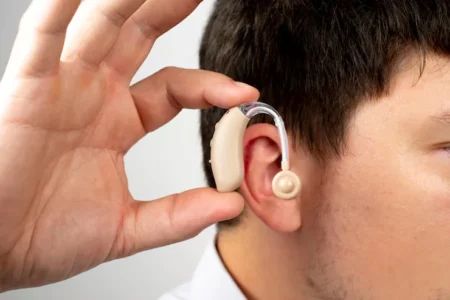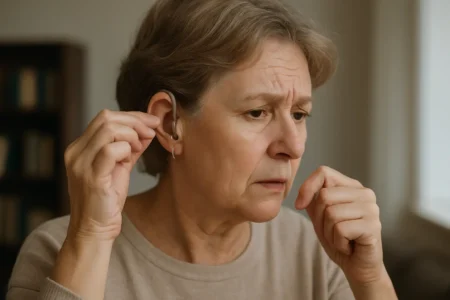Hearing Loss and Cognitive Decline

Hearing loss is frustrating for both those who have it and their loved ones. Not only does it affect one’s ability to hear, it is also linked to many long term health problems. When hearing loss is left untreated, there is an increased risk of cognitive decline and dementia.
What is Dementia?
Dementia is an umbrella term that is used to describe memory loss that affects an individual’s daily life. It affects the ability to remember, think, do simple activities, and make decisions. Dementia most commonly affects older adults, however it is not a normal part of aging. Alzheimer’s disease is the most common type of dementia.
There is strong evidence regarding the severity of hearing loss and the risks associated with developing dementia. If a person has mild hearing loss, their risk for developing dementia doubles. With moderate hearing loss it increases to three times the risk, and up to five times the risk with severe hearing loss. Hearing aid users wait on average, 10 years before getting help for hearing loss. But during that time, communication with loved ones becomes more difficult, and isolation and other health risks increase. It can not be emphasized enough, just how important it is to be proactive in addressing any hearing declines over time.
The temporal lobe is responsible for both processing of auditory information and short term memory. When hearing loss is left untreated, people can become depressed and isolated as interactions can be frustrating. With lack of communication and decreased brain stimulation, the brain atrophies leading to dementia. There is also a significant amount of strain on the brain when trying to hear and make out what others are saying. The good news is that the risk of developing dementia can be reduced.
You Might Also Like: 6 Benefits of Treating Hearing Loss
What can be done to reduce the risk?
If you are struggling to hear, have tinnitus (ringing in ears), or feel as though you aren’t hearing clearly, be proactive and get a hearing test done. Addressing a hearing loss in mid-life is hugely important to reducing the risk factors of developing dementia. Early treatment of hearing aids will not only improve one’s quality of life, it will also help with brain function as we age. Early intervention with hearing aids is the best way to avoid cognitive decline.
Research shows that patients who use hearing aids early on, have the same chances as people with normal hearing to develop dementia. In Canada alone, more than four million people have some degree of hearing loss. When a practitioner suggests the use of a hearing device, it is not for the sole purpose of hearing. It is also to aid in the long term effects such as falls and balance issues, depression and cognitive decline. There is also significant research, that usage of hearing aids can actually improve cognitive function over time.
Symptoms of hearing loss:
If you or someone you know has any of the following symptoms, encourage them to get a hearing test done to determine if there is a hearing loss and what can be done to help:
- Muffling of speech and other sounds
- Trouble distinguishing between consonants
- Difficulty understanding speech in crowds/ loud environments
- Frequently asking others to speak more slowly, clearly and loudly
- Turning up volume of tv, phone, radio
- Reduced social interaction
When older patients have a significant hearing loss, it can sometimes be mistaken for the beginning stages of dementia. Family and friends may notice that their loved ones are responding inappropriately, and using the wrong words. The brain needs to work much harder when there is a hearing loss to fill in the gaps of conversations, which can also cause individuals to forget things.
A hearing assessment is a simple test that can give a hearing practioner and other medical professionals a lot of information about what is going on with the auditory system and the brain. The long term effects of untreated hearing loss can significantly impact the individual, their families and our healthcare system. Even if you don’t think you need hearing aids, or your hearing isn’t that bad, it’s better to know early and receive the proper treatment than to have long term health effects later that can’t be improved.
You Might Also Like
Behind-the-Ear vs. In-the-Ear Hearing Aids: Which One Is Right for You?
Common Mistakes First-Time Hearing Aid Users Make and How to Avoid Them
The Link Between Tinnitus and Hearing Loss: What You Need to Know
Have Questions?
Curious about hearing loss, tinnitus relief, or treatment options in Waterloo? Talk to one of our hearing care professionals today.





